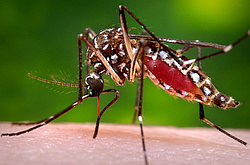
Along with the continued risk of contracting diseases already established in the U.S., climate change and increased globalization are expanding the geographical range of key vectors, such as the mosquito species that transmit chikungunya and zika virus.
Most vector-borne diseases have no cure so, when traveling into your back yard or beyond you’re only left with the choice of an ounce or a pound of prevention.
Fortunately, we can all take steps such as:
- use an effective insect repellent on skin and clothing
- wear long sleeves and long pants (when it's not too hot)
- take care of our yards to get rid of standing water where mosquitoes lay their eggs
- reduce brush, tall grasses, leaf litter, and harborage where ticks may like to hang out
The CDC also provides educational information on approved repellents and other methods for preventing tick and mosquito bites.
OH&S Safety Short: Fight the Bite
